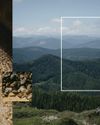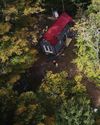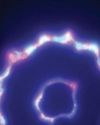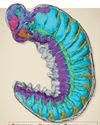
George Washington Carver
Born a slave in 1864, George Washington Carver eventually became the most renowned Black scientist of the 20th century. He developed techniques to prevent soil depletion, encouraging crop rotation by planting sweet potatoes and peanuts. He's often mistakenly attributed for inventing peanut butter. (It was pharmacist Marcellus Gilmore Edson, who patented it in 1884; Ted Lasso and the rest of us are in his debt.) Still, I wouldn't be able to resist asking Carver this one question: Smooth or crunchy?
Amanda Furrer, Gear Editor
RACHEL CARSON
I admire Rachel Carson for being a female pioneer in the environmental movement. When I first read her book Silent Spring as a teenager, I was captivated by her reporting on the destruction of ecosystems from the pesticide DDT, and her observations about the natural world. "There is something infinitely healing in the repeated refrains of nature the assurance that dawn comes after night, and spring after winter," she wrote.
Carson's research on the dangers of pesticides not only saved many vulnerable ecosystems but also potentially protected many humans from DDT exposure, thus setting the stage for better regulation of their use.
"A Who's Who of pesticides is therefore of concern to us all," she wrote. "If we are going to live so intimately with these chemicals, eating and drinking them, taking them into the very marrow of our bones-we had better know something about their nature and their power."
This story is from the {{IssueName}} edition of {{MagazineName}}.
Start your 7-day Magzter GOLD free trial to access thousands of curated premium stories, and 9,000+ magazines and newspapers.
Already a subscriber ? Sign In
This story is from the {{IssueName}} edition of {{MagazineName}}.
Start your 7-day Magzter GOLD free trial to access thousands of curated premium stories, and 9,000+ magazines and newspapers.
Already a subscriber? Sign In

ONE OF THE 'GREATEST THREATS' TO THE PACIFIC NORTHWEST ISN'T WHAT YOU THINK.
EXPERTS ARE PREPARING THE REGION AGAINST THE THREAT OF DANGEROUS VOLCANIC MUDFLOWS, KNOWN AS LAHARS, WHICH COULD INUNDATE THE COMMUNITIES SURROUNDING MT. RAINIER IN AS LITTLE AS 30 MINUTES.

THE WORLD'S TOUGHEST ROW
They rowed 3,000 miles across the Atlantic, battling unpredictable weather, chaotic seas, and finicky equipment. But what they discovered gave them profound new insights into the power of the ocean.

HOW TO DIY OFF-GRID SOLAR
SPEND THE TIME UP FRONT AND PLAN IT CAREFULLY TO AVOID DISAPPOINTMENT

Are We on the Verge of an ARMS RACE in SPACE?
RUMORS OF A RUSSIAN SPACE NUKE, ALONG WITH OTHER SATELLITE-TARGETING WEAPONS, HAVE MADE GEOPOLITICAL TENSIONS EXTEND INTO ORBIT.

Fresh Fingerprints on an Ancient Statue
A CLAY FIGURINE HAS SPENT MILLENNIA incomplete, waiting at the bottom of a lake for its long-dead craftsman to finish the Iron Age-era statuette.

Quantum Entanglement in Our Brains
IT HAS LONG BEEN ARGUED THAT THE human brain is similar to a computer. But in reality, that's selling the brain pretty short.

The Tools of Copernicus
WAY BACK IN 1508, WITH ONLY LIMited tools at his disposal, Nicolaus Copernicus developed a celestial model of a heliocentric planetary system, which he described in hist landmark work De revolutionibus orbium coelestium. It was a complete overhaul of our conception of the universe-one that, unfortunately, earned him the ire of the Catholic church for decades after his death-and forever changed the way we look at the stars.

Building a Sixth-Generation Bomber Raptor
THE GLOBAL COMBAT AIR Programme (GCAP)-a project by the U.K., Italy, and Japan to develop a sixth-generation stealth fighter-has been busy at the drawing board reshaping its vision of the future of air warfare. And judging by the new concept model unveiled at this year's Farnborough air show, that future has big triangular wings.

The Electroweak Force of the Early Universe
TODAY, THE UNIVERSE AS WE KNOW IT IS governed by four fundamental forces: the strong nuclear force, the weak nuclear force, electromagnetism, and gravity.

This Ancient Fossil With a Brain and Guts
WE KNOW WHAT FOSSILS LOOK like. For example, typical dinosaur fossils are bones turned to stone and preserved from the passage of time, located, if we're particularly lucky, in large collections that can be reassembled to represent the beast they used to prop up in their entirety.